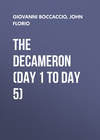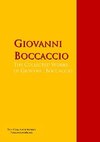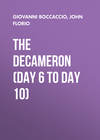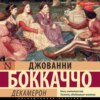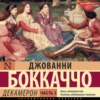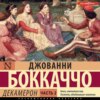Loe raamatut: «The Decameron (Day 1 to Day 5)», lehekülg 9
The fourth Novell
Whereby may be discerned, into how many dangers a man may fall, through a covetous desire to enrich himselfe
Madame Lauretta, sitting next to Madame Pampinea, and seeing how triumphantly shee had finished her discourse; without attending any thing else, spake thus. Gracious Ladies, wee shall never behold (in mine opinion) a greater act of Fortune, then to see a man so suddainly exalted, even from the lowest depth of poverty, to a Royall estate of dignity; as the discourse of Madame Pampinea hath made good, by the happy advancement of Alessandro. And because it appeareth necessary, that whosoever discourseth on the subject proposed, should no way varie from the very same termes; I shall not shame to tell a tale, which, though it containe farre greater mishaps then the former, may sort to as happy an issue, albeit not so noble and magnificent. In which respect, it may (perhaps) merit the lesse attention; but howsoever that fault shall be found in you, I meane to discharge mine owne duty.
Opinion hath made it famous for long time, that the Sea-coast of Rhegium to Gaieta, is the onely delectable part of all Italy, wherein, somewhat neere to Salerno, is a shore looking upon the Sea, which the inhabitants there dwelling, doe call the coast of Malfy, full of small Townes, Gardens, Springs and wealthy men, trading in as many kindes of Merchandizes, as any other people that I know. Among which Townes, there is one, named Ravello, wherein (as yet to this day there are rich people) there was (not long since) a very wealthy man, named Landolpho Ruffolo, who being not contented with his riches, but coveting to multiply them double and trebble, fell in danger, to loose both himselfe and wealth together.
This man (as other Merchants are wont to doe) after hee had considered on his affaires, bought him a very goodly Ship, lading it with divers sorts of Merchandizes, all belonging to himselfe onely, and making his voyage to the Isle of Cyprus. Where he found, over and beside the Merchandizes he had brought thither, many Ships more there arrived, and all laden with the selfe same commodities, in regard whereof, it was needefull for him, not onely to make a good Mart of his goods; but also was further constrained (if hee meant to vent his commodities) to sell them away (almost) for nothing, endangering his utter destruction and overthrow. Whereupon, grieving exceedingly at so great a losse, not knowing what to doe, and seeing, that from very aboundant wealth, hee was likely to fall into as low poverty: hee resolved to dye, or to recompence his losses upon others, because he would not returne home poore, having departed thence so rich.
Meeting with a Merchant, that bought his great Ship of him; with the money made thereof, and also of his other Merchandizes, hee purchased another, being a lighter vessell, apt and proper for the use of a Pirate, arming and furnishing it in ample manner, for roving and robbing upon the Seas. Thus hee began to make other mens goods his owne, especially from the Turkes he tooke much wealth, Fortune being alwayes therein so favourable to him, that hee could never compasse the like by trading. So that, within the space of one yeare, hee had robd and taken so many Gallies from the Turke; that he found himselfe well recovered, not onely of all his losses by Merchandize, but likewise his wealth was wholly redoubled. Finding his losses to be very liberally requited, and having now sufficient, it were folly to hazard a second fall; wherefore, conferring with his owne thoughts, and finding that he had enough, and needed not to covet after more: he fully concluded, now to returne home to his owne house againe, and live upon his goods thus gotten.
Continuing still in feare, of the losses he had sustained by traffique, & minding, never more to imploy his mony that way, but to keep this light vessel, which had holpen him to all his wealth: he commanded his men to put forth their Oares, and shape their course for his owne dwelling. Being aloft in the higher Seas, darke night over-taking them, and a mighty winde suddainly comming upon them: it not onely was contrary to their course, but held on with such impetuous violence; that the small vessell, being unable to endure it, made to land-ward speedily, and in expectation of a more friendly wind, entred a little port of the Sea, directing up into a small Island, and there safely sheltred it selfe. Into the same port which Landolpho had thus taken for his refuge, entred (soone after) two great Carrackes of Genewayes lately come from Constantinople. When the men in them had espied the small Barke, and lockt uppe her passage from getting foorth; understanding the Owners name, and that report had famed him to be very rich, they determined (as men evermore addicted naturally, to covet after money and spoile) to make it their owne as a prize at Sea.
Landing some store of their men, well armed with Crosse-bowes and other weapons, they tooke possession of such a place, where none durst issue forth of the small Barke, but endangered his life with their Darts & Arrowes. Entering aboord the Barke, and making it their owne by full possession, all the men they threw over-boord, without sparing any but Landolpho himselfe, whom they mounted into one of the Carrackes, leaving him nothing but a poore shirt of Maile on his backe, and having rifled the Barke of all her riches, sunke it into the bottome of the sea. The day following, the rough windes being calmed, the Carrackes set saile againe, having a prosperous passage all the day long; but uppon the entrance of darke night, the windes blew more tempestuously then before, and sweld the Sea in such rude stormes, that the two Carracks were sundered each from other, and by violence of the tempest it came to passe, that the Carracke wherein lay poore miserable Landolpho (beneath the Isle of Cephalonia) ran against a rocke, and even as a glasse against a wall, so split the Carracke in peeces, the goods and merchandizes floating on the Sea, Chests, Coffers, Beds, and such like other things, as often hapneth in such lamentable accidents.
Now, notwithstanding the nights obscurity, and impetuous violence of the billowes; such as could swimme, made shift to save their lives by swimming. Others caught hold on such things, as by Fortunes favour floated neerest to them, among whom, distressed Landolpho, desirous to save his life, if possibly it might be, espied a Chest or Coffer before him, ordained (no doubt) to be the meanes of his safety from drowning. Now although the day before, he had wished for death infinite times, rather then to returne home in such wretched poverty; yet, seeing how other men strove for safety of their lives by any helpe, were it never so little, he tooke advantage of this favour offred him, and the rather in a necessitie so urgent. Keeping fast upon the Coffer so well as he could, and being driven by the winds & waves, one while this way, and anon quite contrarie, he made shift for himselfe till day appeared; when looking every way about him, seeing nothing but clouds, the seas and the Coffer, which one while shrunke from under him, and another while supported him, according as the windes and billowes carried it: all that day and night thus he floated up and downe, drinking more then willingly hee would, but almost hunger-starved thorow want of foode. The next morning, either by the appointment of heaven, or power of the Windes, Landolpho who was (well-neere) become a Spundge, holding his armes strongly about the Chest, as wee have seene some doe, who (dreading drowning) take hold on any the very smallest helpe; drew neere unto the shore of the Iland Corfu, where (by good fortune) a poore woman was scowring dishes with the salt water and sand, to make them (house-wife like) neate and cleane.
When shee saw the Chest drawing neere her, and not discerning the shape of any man, shee grew fearefull, and retyring from it, cried out aloude. He had no power of speaking to her, neither did his sight doe him the smallest service; but even as the waves and windes pleased, the Chest was driven still neerer to the Land, and then the woman perceived that it had the forme of a Cofer, and looking more advisedly, beheld two armes extended over it, and afterward, shee espied the face of a man, not being able to judge, whether he were alive, or no. Moved by charitable and womanly compassion, shee stept in among the billowes, and getting fast holde on the haire of his head, drew both the Chest and him to the Land, and calling forth her Daughter to helpe her, with much adoe shee unfolded his armes from the Chest, setting it up on her Daughters head, and then betweene them, Landolpho was led into the Towne, and there conveyed into a warme Stove, where quickly he recovered (by her pains) his strength benummed with extreame cold.
Good wines and comfortable broathes shee cherished him withall, that his sences being indifferently restored, hee knew the place where he was; but not in what manner he was brought thither, till the good woman shewed him the Cofer that had kept him floating upon the waves, and (next under God) had saved his life. The Chest seemed of such slender weight, that nothing of any value could be expected in it, either to recompence the womans great paines and kindnesse bestowne on him, or any matter of his owne benefit. Neverthelesse, the woman being absent, he opened the Chest, and found innumerable precious stones therein, some costly and curiously set in gold, and others not fixed in any mettall. Having knowledge of their great worth and value (being a Merchant, and skild in such matters) he became much comforted, praysing God for this good successe, and such an admirable meanes of deliverance from danger.
Then considering with himselfe, that (in a short time) hee had beene twice well buffeted and beaten by Fortune, and fearing, least a third mishap might follow in like manner; hee consulted with his thoughts, how he might safest order the businesse, and bring so rich a booty (without perill) to his owne home. Wherefore, wrapping up the Jewels in very unsightly cloutes, that no suspition at all should be conceived of them, hee saide to the good woman, that the Chest would not doe him any further service; but if shee pleased to lende him a small sacke or bagge, shee might keepe the Cofer, for in her house it would divers way stead her. The woman gladly did as he desired, and Landolpho returning her infinite thankes, for the loving kindnesse shee had affoorded him, throwing the sacke on his necke, passed by a Barke to Brundusiam, and from thence to Tranium, where Merchants in the City bestowed good garments on him, hee acquainting them with his disasterous fortunes, but not a word concerning his last good successe.
Being come home in safety to Ravello, hee fell on his knees, and thanked God for all his mercies towards him. Then opening the sacke, and viewing the Jewels at more leysure then formerly he had done, he found them to be of so great estimation, that selling them but at ordinary and reasonable rates, he was three times richer, then when hee departed first from his house. And having vented them all, he sent a great sum of money to the good woman at Corfu, that had rescued him out of the Sea, and saved his life in a danger so dreadfull: The like hee did to Tranium, to the Merchants that had newly cloathed him; living richly upon the remainder, and never adventuring more to the Sea, but ended his dayes in wealth and honour.
Andrea de Piero, travelling from Perouse to Naples to buy Horses, was (in the space of one night) surprised by three admirable accidents, out of all which hee fortunately escaped, and, with a rich Ring, returned home to his owne house
The fift Novell
Comprehending, how needfull a thing it is, for a man that travelleth in affaires of the World, to be provident and well advised, and carefully to keepe himselfe from the crafty and deceitfull allurements of Strumpets
The precious Stones and Jewels found by Landolpho, maketh mee to remember (said Madam Fiammetta, who was next to deliver her discourse) a Tale, containing no lesse perils, then that reported by Madam Lauretta: but somewhat different from it, because the one happened in sundry yeeres, and this other had no longer time, then the compasse of one poore night, as instantly I will relate unto you.
As I have heard reported by many, there sometime lived in Perouse or Perugia, a young man, named Andrea de Piero, whose profession was to trade about Horses, in the nature of a Horse-courser, or Horse-master, who hearing of a good Faire or Market (for his purpose) at Naples, did put five hundred Crownes of gold in his purse, and journeyed thither in the company of other Horse-coursers, arriving there on a Sunday in the evening. According to instructions given him by his Host, he went the next day into the Horse-market, where he saw very many Horses that he liked, cheapening their prices as he went up and downe, but could fall to no agreement; yet to manifest that he came purposely to buy, and not as a cheapener onely, often times (like a shalow-brainde trader in the world) he shewed his purse of gold before all passengers, never respecting who, or what they were that observed his follie.
It came to passe, that a young Sicillian wench (very beautifull, but at commaund of whosoever would, and for small hire) passing then by, and (without his perceiving) seeing such store of gold in his purse; presently she said to her selfe: why should not all those crownes be mine, when the foole that owes them, can keepe them no closer? And so she went on. With this young wanton there was (at the same time) an olde woman (as commonly such stuffe is alwayes so attended) seeming to be Sicillian also, who so soone as shee saw Andrea, knew him, and, leaving her youthfull commodity, ranne to him, and embraced him very kindly. Which when the younger Lasse perceived, without proceeding any further, she stayed, to see what would ensue thereon. Andrea conferring with the olde Bawde, and knowing her (but not for any such creature) declared himselfe very affable to her; she making him promise, that shee would come and drinke with him at his lodging. So, breaking off further Speeches for that time, shee returned to her young Cammerado; and Andrea went about buying his horses, still cheapning good store, but did not buy any all that morning.
The Punke that had taken notice of Andreaes purse, upon the olde womans comming backe to her (having formerly studied, how shee might get all the gold, or the greater part thereof) cunningly questioned with her, what the man was, whence hee came, and the occasion of his businesse there? wherein she fully informed her particularly, and in as ample manner as himselfe could have done: That shee had long time dwelt in Sicily with his Father, and afterward at Perouse; recounting also, at what time she came thence, and the cause which now had drawne him to Naples. The witty young housewife, being thorowly instructed, concerning the Parents and kindred of Andrea, their names, quality, and all other circumstances thereto leading; began to frame the foundation of her purpose thereupon, setting her resolution downe constantly, that the purse and gold was (already) more then halfe her owne.
Being come home to her owne house, away shee sent the olde Pandresse about other businesse, which might hold her time long enough of employment, and hinder her returning to Andrea according to promise, purposing, not to trust her in this serious piece of service. Calling a young crafty Girle to her, whom she had well tutoured in the like ambassages, when evening drew on, she sent her to Andreas lodging, where (by good fortune) she found him sitting alone at the dore, and demanding of him, if he knew an honest Gentleman lodging there, whose name was Signior Andrea de Piero; he made her answere, that himselfe was the man. Then taking him aside, shee said. Sir, there is a worthy Gentlewoman of this Citie, that would gladly speake with you, if you pleased to vouchsafe her so much favour.
Andrea, hearing such a kinde of salutation, and from a Gentlewoman, named of worth; began to grow proud in his owne imaginations, and to make no meane estimation of himselfe: As (undoubtedly) that he was an hansome proper man, and of such carriage and perfections, as had attracted the amorous eye of this Gentlewoman, and induced her to like and love him beyond all other, Naples not contayning a man of better merit. Whereupon he answered the Mayde, that he was ready to attend her Mistresse, desiring to know, when it should be, and where the Gentlewoman would speake with him? So soone as you please Sir, replied the Damosell, for she tarieth your comming in her owne house.
Instantly Andrea (without leaving any direction of his departure in his lodging, or when he intended to returne againe) said to the Girle: Goe before, and I will follow. This little Chamber-commodity, conducted him to her Mistresses dwelling, which was in a streete named Malpertuis, a title manifesting sufficiently the streetes honesty: but hee, having no such knowledge thereof, neither suspecting any harme at all, but that he went to a most honest house, and to a Gentlewoman of good respect; entred boldly, the Mayde going in before, and guiding him up a faire payre of stayres, which he having more then halfe ascended, the cunning young Queane gave a call to her Mistresse, saying; Signior Andrea is come already, whereupon, she appeared at the stayres-head, as if she had stayed there purposely to entertaine him. She was young, very beautifull, comely of person, and rich in adornements, which Andrea well observing, & seeing her descend two or three steps, with open armes to embrace him, catching fast hold about his neck; he stood as a man confounded with admiration, and she contained a cunning kinde of silence, even as if she were unable to utter one word, seeming hindered by extremity of joy at his presence, and to make him effectually admire her extraordinary kindnesse, having teares plenteously at commaund, intermixed with sighes and broken speeches, at last, thus she spake.
Signior Andrea, you are the most welcom friend to me in all the world; sealing this salutation with infinite sweet kisses and embraces: whereat (in wonderfull amazement) he being strangely transported, replied; Madame, you honour me beyond all compasse of merit. Then, taking him by the hand, shee guided him thorow a goodly Hall, into her owne Chamber, which was delicately embalmed with Roses, Orenge-flowres, and all other pleasing smelles, and a costly bed in the middest, curtained round about, very artificiall Pictures beautifying the walles, with many other embellishments, such as those Countries are liberally stored withall. He being meerely a novice in these kinds of wanton carriages of the World, and free from any base or degenerate conceit; firmely perswaded himselfe, that (questionlesse) shee was a Lady of no meane esteeme, and he more then happy, to be thus respected and honoured by her. They both being seated on a curious Chest at the Beds feete, teares cunningly trickling downe her cheekes, and sighes intermedled with inward sobbings, breathed forth in sad, but very seemely manner; thus shee beganne.
I am sure Andrea, that you greatly marvell at me, in gracing you with this solemne and kinde entertainment, and why I should so melt my selfe in sighes and teares, at a man that hath no knowledge of me, or (perhaps) sildome or never heard any Speeches of me: but you shall instantly receive from mee matter to augment your greater marvell, meeting heere with your owne sister, beyond all hope or expectation in either of us both. But seeing that Heaven hath beene so gracious to me, to let mee see one of my brethren before I die (though gladly I would have seene them all) which is some addition of comfort to me, and that which (happily) thou hast never heard before, in plaine and truest manner, I will reveale unto thee.
Piero, my Father and thine, dwelt long time (as thou canst not chuse but to have understood) in Palermo, where, through the bounty, and other gracious good parts remaining in him, he was much renowned; and (to this day) is no doubt remembred, by many of his loving friends and well-willers. Among them that most intimately affected Piero, my mother (who was a Gentlewoman, and at that time a widow) did dearest of all other love him; so that forgetting the feare of her Father, brethren, yea, and her owne honour, they became so privately acquainted, that I was begotten, and am here now such as thou seest me. Afterward, occasions so befalling our Father, to abandon Palermo, and returne to Perouse, he left my mother and me his little daughter, never after (for ought that I could learne) once remembring either her or me: so that (if he had not beene my Father) I could have much condemned him, in regard of his ingratitude to my Mother, and love which hee ought to have shewne me as his childe, being borne of no Chamber-maide, neither of a City sinner; albeit I must needes say, that shee was blame-worthy, without any further knowledge of him (moved onely thereto by most loyal affection) to commit both her selfe, and all the wealth shee had, into his hands: but things ill done, and so long time since, are more easily controled, then amended.
Being left so young at Palermo, and growing (well neere) to the stature as now you see me; my mother, being wealthy, gave mee in marriage to one of the Gergentes Family, a Gentleman, and of great revenewes, who in his love to me and my mother, went and dwelt at Palermo: where falling into the Guelphes faction, and making one in the enterprize with Charles our King; it came to passe, that they were discovered to Fredericke King of Arragon, before their intent could be put in execution, whereupon, we were enforced to flie from Sicilie, even when my hope stood fairely to have beene the greatest Lady in all the Iland. Packing up then such few things as wee could take with us, few I may well call them, in regard of our wealthy possessions, both in Pallaces, Houses, and Lands, all which we were constrained to forgoe: we made our recourse to this City, where wee found King Charles so benigne and gracious to us, that recompencing the greater part of our losses, he bestowed Lands and Houses on us here, beside a continuall large pension to my husband your brother in Law, as hereafter himselfe shall better acquaint you withall. Thus came I hither, and thus remaine here, where I am able to welcome my brother Andrea, thankes more to Fortune, then any friendlinesse in him: with which words she embraced and kissed him many times, sighing and weeping as shee did before.
Andrea hearing this fable so artificially delivered, composed from point to point, with such likely protestations, without faltring or failing in any one words utterance; and remembring perfectly for truth, that his Father had formerly dwelt at Palermo; knowing also (by some sensible feeling in himselfe) the custome of young people, who are easily conquered by affection in their youthfull heate; seeing beside the teares, trembling speeches, and earnest embracings of this cunning commodity: he tooke all to be faithfully true by her thus spoken, and upon her silence, thus he replied. Lady, let it not seeme strange to you, that your words have raised marvell in me, because (indeede) I had no knowledge of you, even no more then as if I had never seene you, never also having heard my Father to speake either of you or your Mother (for some considerations best knowne to himselfe) or if at any time he used such language, either my youth then, or defective memory since, hath utterly lost it. But truly, it is no little joy and comfort to me, to finde a sister here, where I had no such hope or expectation, and where also my selfe am a meere stranger. For to speake my mind freely of you, and the perfections gracefully appearing in you, I know not any man, of how great repute or quality soever, but you may well beseeme his acceptance, much rather then mine, that am but a meane Merchant. But faire sister, I desire to be resolved in one thing, to wit, by what meanes you had understanding of my being in this City? whereto readily shee returned him this answer.
Brother, a poore woman of this City, whom I employ sometimes in houshold occasions, came to me this morning, and (having seene you) tolde me, that shee dwelt a long while with our Father, both at Palermo, and Perouse. And because I held it much better beseeming my condition, to have you visit me in mine owne dwelling, then I to come see you at a common Inne; I made the bolder to send for you hither. After which words, in very orderly manner, shee enquired of his chiefest kindred and friends, calling them readily by their proper names, according to her former instructions. Whereto Andrea still made her answer, confirming thereby his beliefe of her the more strongly, and crediting whatsoever shee saide, farre better then before.
Their conference having long time continued, and the heate of the day being somewhat extraordinary, shee called for Greeke wine, and banquetting stuffe, drinking to Andrea; and he pledging her very contentedly. After which, he would have returned to his lodging, because it drew neere supper time; which by no meanes shee would permit, but seeming more then halfe displeased, shee saide. Now I plainely perceive brother, how little account you make of me, considering, you are with your owne Sister, who (you say) you never saw before, and in her owne House, whether you should alwayes resort when you come to this City; and would you now refuse her, to goe and sup at a common Inne. Beleeve me brother, you shall sup with me, for although my Husband is now from home, to my no little discontentment: yet you shall find brother, that his wife can bid you welcome, and make you good cheere beside.
Now was Andrea so confounded with this extremity of courtesie, that he knew not what to say, but onely thus replied. I love you as a Sister ought to be loved, and accept of your exceeding kindnesse: but if I returne not to my lodging, I shall wrong mine Host and his guests too much, because they will not sup untill I come. For that (quoth shee) we have a present remedy, one of my servants shal goe and give warning, whereby they shall not tarry your comming. Albeit, you might doe me a great kindnesse, to send for your friends to sup with us here, where I assure ye they shall finde that your Sister (for your sake) will bid them welcome, and after supper, you may all walke together to your Inne. Andrea answered, that he had no such friends there, as should be so burthenous to her: but seeing shee urged him so farre, he would stay to sup with her, and referred himselfe solely to her disposition.
Ceremonious shew was made, of sending a servant to the Inne, for not expecting Andreas presence at Supper, though no such matter was performed; but, after divers other discoursings, the table being covered, and variety of costly viands placed thereon, downe they sate to feeding, with plenty of curious Wines liberally walking about, so that it was darke night before they arose from the table. Andrea then offring to take his leave, she would (by no meanes) suffer it, but tolde him that Naples was a Citie of such strict Lawes and Ordinances, as admitted no night-walkers, although they were Natives, much lesse strangers, but punished them with great severity. And therefore, as she had formerly sent word to his Inne, that they should not expect his comming to supper, the like had she done concerning his bed, intending to give her Brother Andrea one nights lodging, which as easily she could affoord him, as she hadde done a Supper. All which this new-caught Woodcocke verily crediting, and that he was in company of his owne Sister Fiordeliza (for so did she cunningly stile her selfe, and in which beleefe hee was meerely deluded) he accepted the more gladly her gentle offer, and concluded to stay there all that night.
After supper, their conference lasted very long, purposely dilated out in length, that a great part of the night might therein be wasted: when, leaving Andrea to his Chamber, and a Lad to attend, that he shold lacke nothing; she with her women went to their lodgings, and thus our brother and supposed Sister were parted. The season then being somewhat hot and soultry, Andrea put off his hose and doublet, and beeing in his shirt alone, layed them underneath the beds boulster, as seeming carefull of his money. But finding a provocation to the house of Office, he demanded of the Lad, where hee might find it; who shewed him a little doore in a corner of the Chamber, appointing him to enter there. Safely enough he went in, but chanced to tread upon a board, which was fastened at neither ende to the joynts whereon it lay, being a pit-fall made of purpose, to entrap any such coxecombe, as would be trained to so base a place of lodging, so that both he and the board fell downe together into the draught; yet such being his good fortune, to receive no harme in the fall (although it was of extraordinary height) onely the filth of the place, (it being over full) had fowly myred him.
Now for your better understanding the quality of the place, and what ensued thereupon, it is not unnecessary to describe it, according to a common use observed in those parts. There was a narrow passage or entrie, as often we see reserved betweene two houses, for eithers benefit to such a needfull place; and boards loosely lay upon the joynts, which such as were acquainted withall, could easily avoide any perill, in passing to or from the stoole. But our so newly created brother, not dreaming to find a queane to his Sister, receiving so foule a fall into the vaulte, and knowing not how to helpe himselfe, being sorrowfull beyond measure; cryed out to the boy for light and aide, who intended not to give him any. For the crafty wag, (a meete attendant for so honest a Mistresse) no sooner heard him to be fallen, but presently he ranne to enforme her thereof, and shee as speedily returned to the Chamber, where finding his cloathes under the beds head, shee needed no instruction for search in his pockets. But having found the gold, which Andrea indiscreetely carried alwayes about him, as thinking it could no where else be so safe: This was all shee aymed at, and for which shee had ensnared him, faigning her selfe to be of Palermo, and Daughter to Piero of Perouse, so that not regarding him any longer, but making fast the house of Office doore, there shee left him in that miserable taking.
